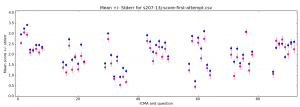We have become aware of a significant difference in outcome for male and female students on our level 2 physics module; around 25% of the students on the module are women, and they are both less likely to complete the module and less likely to pass if they survive to the end. This effect is not present in our level 1 Science Module or for other scientific disciplines apart from astronomy at Level 2; and the women who get through to Level 3 do better than men.
Many theories have been proposed as to the reason for the effect, which may be related to persistent gender differences in performance on the force concept inventory – see for example Bates et al. (2013). I proposed that the effect might have been related to the assessment we use; there is evidence (e.g. Gipps & Murphy, 1994; Hazel et al., 1997) that girls are less happy with multiple-choice questions.
One of the things we have done is looked at performance differences on each interactive computer-marked assignment question. The results are summarised in the figure below (click on it to see the detail).
Points to note are as follows:
Women score less well than men on most questions, but the effect is no greater than for tutor-marked assignment questions.
The gender difference is much greater for some questions than others; but the questions with a large differences are not all questions of one type. So multiple-choice is not to blame! It appears more likely that the issue is with what the questions are assessing; there is some indication that our female students are less good at complex, abstract, problem-solving type questions.
The gender difference is much less for the final iCMA. My hypothesis is that the usual reasons for women doing less well are counter-balanced by the fact that women are more persistent; they are more likely to attempt this iCMA whilst men are more likely to reckon they have reached the required threshold on 5 out of 7 iCMAs, and so not to bother.
More work is required before I can be confident of this analysis; it is an interesting and extremely important investigation.
References
Bates, S., Donnelly, R., MacPhee, C., Sands, D., Birch, M., & Walet, N. R. (2013). Gender differences in conceptual understanding of Newtonian mechanics: a UK cross-institution comparison. European Journal of Physics, 34(2), 421-434.
Gipps, C. V. & Murphy, P. (1994). A fair test? Assessment, achievement and equity. Buckingham: Open University Press.
Hazel, E., Logan, P., & Gallagher, P. (1997). Equitable assessment of students in physics: importance of gender and language background. International Journal of Science Education, 19(4), 381-392.

